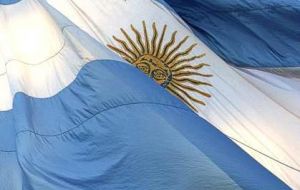MercoPress. South Atlantic News Agency
Argentina’s spat with Uruguay not exclusive, say diplomats

The diplomatic spat to which Uruguay is being exposed by Argentina over the Botnia pulp mill conflict is not exclusive or an isolated case, it was revealed during a recent meeting of Uruguayan ambassadors that returned to Montevideo to address trade issues.
At the two day meeting with Foreign Affairs minister Gonzalo Fernandez and other ministerial officials most of the ambassadors mentioned incidents which involve the Argentine administration of President Cristina Fernandez de Kirchner and her husband Nestor Kirchner.
One of the most serious incidents was during the last celebration of Argentina’s May Revolution Day, May 25th, when the whole government moved for the commemoration to a northern province. According to Uruguayan diplomats, 19 of the 22 European Union ambassadors in Buenos Aires did not turn up because of reiterated differences or “blocked lines” with Mrs. Kirchner’s administration.
The only EU ambassadors present at the ceremony were those from Britain, Romania and Belgium.
Another very serious incident refers to Chile, a strong investor in Argentina which has had to endure, for several years now, the Kirchners domestic market-priority policy for natural gas in spite of international contracts.
In this case a pulp mill in the province of Corrientes, belonging to a Chilean company and with investments over 350 million US dollars was impeded from operating blocked by the teamsters union whose leader Hugo Moyano happens to be the chairman of Argentina’s largest unions federation and close ally of the Kirchners administrations.
Following hours of negotiations between union leaders, Argentine officials and business representatives from both countries the incident was finally tempered down, avoiding a second pulp mill dispute, similar to that which has virtually blocked “normal” links with Uruguay.
Argentina not only has taken Uruguay to the International Court of Justice in The Hague over the Botnia pulp mill but has looked aside on Argentine pickets which have been blocking the main international bridge between the neighbouring countries for over three years, alleging environmental hazards that have been repeatedly proven, (even by Argentine scientists) as unfounded.
Argentina has also blocked the joint dredging of one of the two access channels in the River Plate which is vital for Uruguayan ports west of Montevideo and from where most pulp, paper, grains and oilseed exports are shipped.
Similarly Argentina recently denied landing rights to Uruguayan airlines which were scheduled to fly to several provincial cities. It has also limited financial operations from Montevideo alleging Uruguay is listed as a “fiscal paradise”.
In spite of the photos and the so called “strategic alliance” with Brazil, Argentina has uncomfortable relations with Brasilia, its main trade associate. Argentina’s protectionist stance in trade issues has triggered complaints from Brazilian exporters and Brazilian diplomats in international forums. Brazil is a strong promoter of free trade and lowering trade barriers.
With Spain, Italy and France, traditional supporters of Argentina, the Kirchners administration has repeatedly offended or ignored them with the way it handles corporations of those countries with interests in Argentina. Some of them such as YPF, Aerolineas Argentinas and waterworks ended re-nationalized.
Relations with the President Obama administration have so far been limited to an epistolary exchange while neighbouring Brazil and Chile have had a privileged personal attention from the new White House leader.
US diplomacy has also very much in mind that when former president George W Bush participated in the Americas summit in Mar del Plata, in 2005, then President Nestor Kirchner not only embarrassed the US leader before his Latinamerican peers, but it has now surfaced he financed and organized, with the help from Venezuela’s Hugo Chavez and Cuba’s Fidel Castro, a counter “peoples” summit whose only purpose was derogatory of the US and to ridicule Bush.
Finally relations with who seems to be the Kirchner couple main ally, Venezuela’s Hugo Chavez, have been to say the least rather eclectic. Chavez not only has purchased sovereign bonds at rock bottom prices from Argentina that remains banned from the international money markets, he lately nationalized several Argentine companies in Venezuela triggering serious protests from the Argentine industrialists.
And while this was happening, Chavez in Brazil, on unnoticed open microphones connected to a press room, was telling President Lula da Silva, to a roaring ministerial chorus, that Brazilian companies would not be taken over.




Top Comments
Disclaimer & comment rulesCommenting for this story is now closed.
If you have a Facebook account, become a fan and comment on our Facebook Page!